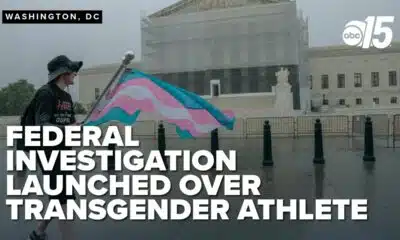News from the South - Texas News Feed
Stricter bail rules advance through Texas House
“Stricter bail rules advance through Texas House, which had blocked an overhaul in previous sessions” was first published by The Texas Tribune, a nonprofit, nonpartisan media organization that informs Texans — and engages with them — about public policy, politics, government and statewide issues.
Sign up for The Brief, The Texas Tribune’s daily newsletter that keeps readers up to speed on the most essential Texas news.
The Texas House on Monday advanced a sweeping package to crack down on bail laws, setting a longtime priority of Gov. Greg Abbott’s — to keep more dangerous people accused of violent crimes behind bars — on its clearest path to passage in years.
Lawmakers adopted the package’s centerpiece proposal asking voters to amend the state Constitution to create a list of violent offenses for which, in certain cases, judges must deny bail. Once the Senate concurs on the House’s version, as expected, the measure will be placed before voters on November’s ballot.
But a constitutional amendment to automatically deny bail to any unauthorized migrant accused of certain felonies failed to win the 100 votes required for passage. Because it received support from a majority, 88 to 50, it will have one more shot at adoption this week.
And the House gave initial approval to Senate Bill 9, which would restrict who is eligible for release on cashless personal bonds and allow the state to appeal bail decisions, leaving a defendant jailed for up to 20 days as the appeal is litigated. House lawmakers also advanced Senate Bill 40, which would bar municipalities from using public funds to bail defendants out of jail. Both bills must pass the House once more before going to the Senate, which has already passed its versions of the legislation.
Under the state Constitution, almost everyone who is arrested has the right to be released on bail. The limited exceptions are people charged with capital murder and those accused of certain repeat felonies or bail violations. According to the U.S. Constitution and the U.S. Supreme Court, bail cannot be excessive, and pretrial detention largely should not be considered the default, as criminal defendants are still legally presumed innocent.
Rep. John Smithee, R-Amarillo and chair of the House Criminal Jurisprudence committee, argued that stricter bail laws were necessary to protect the public from crime committed by dangerous defendants out on bail.
“I’ve never voted on any legislation more important than what we’re getting ready to consider, because it holds the very key to life or death of some very wonderful people, some very innocent people,” he said, telling lawmakers about the families of violent crime victims he had spoken to. “This is what crime has done to some of our families. And what all of these cases and so many more have in common is, they are a result of what Governor Abbott has described as a broken bail system.”
“It may not be perfect, but it’s the best we could do to fix a system that’s been broken for a long time,” Smithee added. “We’ve been working on this for 10 years now, and it’s finally time to get this done.”
The House’s approval of the bail package marks a significant victory for Abbott, who has made tightening the state’s bail laws an emergency item for three consecutive sessions. While lawmakers have previously approved more modest measures limiting the use of cashless bonds, more expansive proposals to overhaul the state’s bail laws have repeatedly died in the lower chamber.
“We’ve been working hard on this for a long time,” Abbott said to reporters on the House floor Monday. “Too many people have been murdered because of the broken bail system that we’ve had, and the members of the House stepped up and did what they needed to do for their constituents, which is to cast a vote that’s going to save lives in their districts.”
Bail is a legal tool used around the country to incentivize people accused of a crime to appear at court hearings. Defendants can pay the full bail amount, which is refundable if they go to all their hearings, or they can pay a nonrefundable partial deposit to a bail bond company that fronts the full amount. People who cannot afford to pay a deposit or their bail are often left detained for weeks or months, even though bail amounts are not meant to serve as a form of punishment.
The bipartisan effort to push the package over the finish line, despite initial opposition from some Democrats and civil rights groups, reflected the shifting politics of crime and immigration across the nation. The package’s movement in the House continued a longer-term evolution in the state’s approach to criminal justice reform, from a focus on reducing mass incarceration and wealth-based detention to increasing certain criminal penalties and keeping dangerous defendants in jail.
“We wouldn’t be here if there weren’t real life examples of people being released who plainly should not have been,” said Rep. Joe Moody of El Paso, the lead Democratic negotiator, adding that he was committed to addressing low-level offenders locked behind bars simply because they could not afford their bail.
“That’s how the bail reform conversation started a decade ago,” he said. “For every improperly released defendant who commits a serious crime, there’s 100 low-level offenders held when they shouldn’t be, whose lives are upended. We need to do both.”
Top Republicans and Democrats spent weeks negotiating a package that could gain traction across parties, and they ultimately produced legislation more stringent than initially proposed even while narrowing the types of defendants who would be subject to the harsher rules.
Republicans cast the issue as one of life-or-death, arguing that stricter bail laws are necessary to keep dangerous defendants locked up and to hold judges accountable. They pointed to numerous examples of violent crime committed by people let out on bond, and highlighted the stories of victims and their loved ones.
“Of all the things I’ve had an opportunity to work on in my life, this may be the most important,” Rep. Mitch Little, R-Lewisville, said. “We have an opportunity to heal a grievous wound to our state and to our communities.”
Civil rights groups and some Democrats, meanwhile, argued that the measures tied the hands of judges and infringed on the civil rights of anyone accused of certain crimes.
Senate Joint Resolution 5, which would require judges to deny bail in certain cases, was approved overwhelmingly, 133 to eight — winning approval by a larger margin than a less stringent proposal in 2021. That legislation, House Joint Resolution 4, was approved 104 to 35, but failed as a casualty of a Democratic walkout over a voting bill.
As approved by the House, SJR 5 goes further than the Senate’s original proposal by requiring judges to deny bail in certain cases, rather than simply giving them the discretion to do so.
The stiffer language was demanded by Abbott, who argued that constitutionally requiring the denial of bail for certain violent offenses was necessary to rein in “activist judges” setting low or cashless bail for defendants who proceed to commit more crimes while out of jail.
But the legislation softens Abbott’s proposal by requiring the state to show that a defendant is either a flight or public safety risk to obligate a denial of bail — instead of forcing defendants to prove that they are not a danger and will appear in court to get bail. It also grants defendants the right to an attorney in their bail hearings.
Some Democrats initially blasted the idea that judges would be forced to deny bail in any case, arguing that detaining more defendants before trial would inflate the state’s already overcrowded jail population and hamstring judicial discretion. Still, only eight opposed the resolution.
“This historic vote shows that the Texas House has decided to put public safety above party politics,” Nikki Pressley, Texas state director of Right on Crime at the Texas Public Policy Foundation, said in a statement. “This collaboration will undeniably make Texas stronger and our communities safer.”
Civil rights groups argued that SJR 5 flew in the face of the U.S. Supreme Court’s finding that liberty, not detention, is the “norm,” and pointed to stories of people who were wrongfully accused and detained for weeks. Advocates argued that holding more people behind bars before trial would separate them from their communities and hurt public safety, citing studies finding that pretrial detention increased a person’s likelihood of committing crimes in the future.
Senate Joint Resolution 1 — a novel proposal to automatically deny bail and detain any unauthorized migrant accused of certain felonies — faced greater opposition and won just two Democratic votes in favor.
Smithee said Monday that he would work with Democrats on an amendment to exempt more protected immigration statuses from the legislation’s automatic denial of bail, with the hopes that that would be enough to earn enough Democratic support when the House tries again.
SJR 1 includes a narrower definition of “illegal alien” than initially proposed to avoid sweeping in lawful permanent residents and those granted protected statuses, such as asylum and military parole in place, which is given to certain family members of U.S. service members.
Still, Democrats also offered several amendments to expand the protected classes under the resolution.
Rep. Ramon Romero Jr., D-Fort Worth, asked lawmakers to protect Deferred Action for Childhood Arrivals defendants and those with active applications for lawful presence in the United States under the Violence Against Women Act.
“The DACA people that I know are as American as every single one of us,” Romero said, adding that his siblings were both recipients of the program. “They know no home other than the United States of America, and they are not a flight risk.”
Both of his amendments were rejected.
Rep. Mary Gonzalez, D-Clint, offered, then withdrew, an amendment to exempt victims of human trafficking and other crimes who receive T and U visas after Smithee agreed to work with her on an alternative.
Democrats in opposition to SJR 1 argued that the measure would unconstitutionally undermine defendants’ due process and equal protection rights by precluding individualized consideration of each case to determine bail conditions.
“Immigration determinations are an extremely complex matter,” Rep. Erin Gaméz, D-Brownsville, said, arguing that the magistrates responsible for bail do not have the training nor resources to determine defendants’ immigration status. “There are immigration judges who spend hours making this careful determination — entire courts that have been carved out alone to make these very carefully planned out judicial determinations.”
The House’s version of SJR 1 also limits the types of offenses for which an undocumented defendant would be denied bail — from all felonies as proposed by the Senate, to certain election felonies, drug-dealing crimes and the most serious violent felonies, including murder, sexual assault, human trafficking and aggravated robbery. And it provides for a transfer of an undocumented defendant to federal custody.
“This resolution began as something that I would never vote for,” Moody said before outlining the changes made to narrow its provisions. “On a policy level, the concept here is not offensive — if a person has already broken our immigration rules, they’re probably a flight risk as well. … But I also get how incendiary this issue is. So it’s a very reluctant vote from me.”
He voted in favor of the legislation, but objected to rhetoric that cast all unauthorized migrants as dangerous criminals.
“From Twitter to town halls, the language around immigration is toxic,” he said, noting the anti-immigrant sentiment that drove the 2019 mass shooting at an El Paso Walmart. “It’s dehumanizing, and in some cases, it’s nakedly racist. … And that makes it very hard to deal with just the policy on the paper.”
While SJR 5, SJR 1 and SB 9 are the primary bail provisions this session, both chambers have also approved a measure requiring judges to produce written findings explaining their decision to set bail after finding “no probable cause” that a defendant committed the offense for which they were arrested.
And last week, the Senate swiftly approved another bail constitutional amendment, Senate Joint Resolution 87, to require judges to deny bail to certain repeat offenders if they find, before trial or any evidentiary hearings, that there is probable cause that the defendant committed the crime. Its sponsor, Sen. Joan Huffman, R-Houston, said the measure was necessary to keep dangerous criminals behind bars.
Little offered an amendment on Monday that would have grafted the provisions of SJR 87 onto SJR 5. The amendment was taken down on a technical challenge.
Civil rights advocates, the only witnesses to testify before the Senate panel considering SJR 87 just hours after it was introduced, condemned the legislation as requiring detention without due process, and highlighted the hundreds of Texans wrongfully accused and convicted of crimes.
“I am confused and disturbed by the introduction of yet another constitutional amendment that doubles down on stripping discretion away from judges, and the unconstitutional practice of automatically denying bail without an individualized assessment of risk,” Kirsten Budwine, a policy attorney at the Texas Civil Rights Project, testified last week.
SJR 87 has yet to be heard in committee in the House. It was unclear if it would have a path to 100 votes.
“The bail package that has already been negotiated will overhaul the entire bail system in a way that will be felt for generations to come,” Budwine added. “This constitutional amendment adds insult to injury.”
Renzo Downey contributed to this report.
Disclosure: Texas Public Policy Foundation has been a financial supporter of The Texas Tribune, a nonprofit, nonpartisan news organization that is funded in part by donations from members, foundations and corporate sponsors. Financial supporters play no role in the Tribune’s journalism. Find a complete list of them here.
First round of TribFest speakers announced! Pulitzer Prize-winning columnist Maureen Dowd; U.S. Rep. Tony Gonzales, R-San Antonio; Fort Worth Mayor Mattie Parker; U.S. Sen. Adam Schiff, D-California; and U.S. Rep. Jasmine Crockett, D-Dallas are taking the stage Nov. 13–15 in Austin. Get your tickets today!
This article originally appeared in The Texas Tribune at https://www.texastribune.org/2025/05/19/texas-bail-overhaul-house-passage/.
The Texas Tribune is a member-supported, nonpartisan newsroom informing and engaging Texans on state politics and policy. Learn more at texastribune.org.
The post Stricter bail rules advance through Texas House appeared first on feeds.texastribune.org
Note: The following A.I. based commentary is not part of the original article, reproduced above, but is offered in the hopes that it will promote greater media literacy and critical thinking, by making any potential bias more visible to the reader –Staff Editor.
Political Bias Rating: Center-Right
The article covers the Texas House’s advancement of a bail overhaul package championed by Republican Governor Greg Abbott. The language and tone reflect support for tougher bail laws, with frequent references to public safety concerns and the need to keep dangerous defendants behind bars. While it acknowledges opposition from civil rights groups and some Democrats, the article focuses more on the actions and priorities of Republicans, particularly Abbott, who has made bail reform a central issue. The inclusion of statements from both sides indicates a degree of balance, but the emphasis on law-and-order framing aligns more closely with a center-right stance.
News from the South - Texas News Feed
Slawinski's small town toughness starts in Johnson City
SUMMARY: Johnny Slawinski, a top MLB Draft prospect from Johnson City, Texas, stands out as a talented left-handed pitcher from an unlikely small-town background. Johnson City, with a population of around 2,000, has never had a player drafted into Major League Baseball before. Despite playing on a challenging high school field with poor conditions, Slawinski’s confidence and skill have earned him recognition as the 68th overall prospect. Committed to Texas A&M, he faces a choice between college baseball and going pro. Proud of his humble roots, Slawinski appreciates the close-knit community and the mental toughness developed on his hometown field.
The post Slawinski's small town toughness starts in Johnson City appeared first on www.kxan.com
News from the South - Texas News Feed
What’s happening with the money Travis County approved for affordable child care?
SUMMARY: Travis County approved a 2.5-cent property tax increase in November to fund affordable child care, generating about \$75 million in its first year. This funding aims to create 1,900 child care slots for low-income babies and toddlers and nearly 3,900 after-school and summer slots for elementary students, while incentivizing businesses to expand child care options. Early services are launching this summer and fall, including funding waitlisted families, supporting working parents, and expanding existing programs. Public input has influenced these efforts, especially for children under three, prompting the county to accelerate funding initiatives and partnerships with Austin. The next update is due July 15.
The post What's happening with the money Travis County approved for affordable child care? appeared first on www.kxan.com
News from the South - Texas News Feed
2025 Texas Longhorns football preview: The running back room looks loaded
SUMMARY: The Texas Longhorns running back room is poised for a stronger 2025 season after injuries sidelined key players like CJ Baxter and Christian Clark in 2024. Baxter, returning healthy, is expected to lead alongside Quintrevion Wisner, who rushed for over 1,000 yards last year, and bruising freshman Jerrick Gibson. Depth is bolstered by promising recruits James Simon and Rickey Stewart Jr. The offense may gain new versatility with quarterback Arch Manning’s mobility. However, Texas must improve ball security after fumbling 26 times in 2024. Additionally, new running backs coach Chad Scott replaces Tashard Choice, bringing experience from West Virginia.
The post 2025 Texas Longhorns football preview: The running back room looks loaded appeared first on www.kxan.com
-
News from the South - Georgia News Feed7 days ago
Are you addicted to ‘fridge cigarettes’? Here’s what the Gen Z term means
-
News from the South - South Carolina News Feed6 days ago
Federal investigation launched into Minnesota after transgender athlete leads team to championship
-
News from the South - Tennessee News Feed6 days ago
Democratic resolution to block military action in Iran fails to advance in US Senate
-
The Center Square5 days ago
U.S. Senate prepares for passage of One Big Beautiful Bill Act | National
-
News from the South - Tennessee News Feed7 days ago
'Flying blind': Tennessee won't track existing private school students who receive vouchers
-
News from the South - Louisiana News Feed5 days ago
Water company hiked sewage rates in Lafayette to state’s highest
-
Mississippi Today7 days ago
Mississippi school superintendents indicted on fraud charges
-
News from the South - Arkansas News Feed5 days ago
Thousands celebrate pride, progress at the 2025 NWA Pride Parade









































